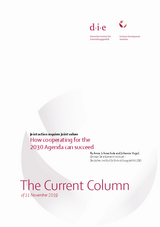Joint action requires joint values
How cooperating for the 2030 Agenda can succeed
Schwachula, Anna / Johanna VogelThe Current Column (2019)
Bonn: German Development Institute / Deutsches Institut für Entwicklungspolitik (DIE), The Current Column of 4 November 2019
Bonn, 4 November 2019. The 2030 Agenda for Sustainable Development has made development a global issue. When it comes to climate-friendly and socially-responsible lifestyles, the nations of the global North are also developing countries. This new perspective on global sustainable development requires new approaches. We hear repeatedly of the need to jettison the silo mentality in order to take proper account of the complex challenges posed by the Sustainable Development Goals (SDGs). Transdisciplinary and transnational cooperation between peers is considered the method of choice for solution-oriented research. Partners from the global North and South involved in policy making, business, civil society and research shall work together on knowledge-based solutions. However, there is a major disconnect between the vision of partnership-based cooperation and the way it is implemented in practice. Existing partnerships are often characterised by inequalities and power imbalances. Take, for example, cases where researchers from the global North define the research question for a sustainability issue in the global South, interpret the data and stipulate the supposedly correct solution, while partners from the South merely supply data. Why is this still occurring in 2019? Cooperation is demanding. Giving equal consideration to the knowledge offered by all the actors involved is challenging. We need to redefine knowledge hierarchies and traditional role allocations if the North is also to learn from the South. For partners from the North, this means setting aside old mindsets and privileges in favour of an equal partnership, even if that partnership is still often financed by the North. After all, cooperation is worth the effort, and not only because SDG 17 highlights cross-sectoral and cross-border cooperation as an instrument for tackling global challenges. Recognising the value of different types of knowledge, be they from the global South or North, from everyday society, from the world of policy-making or from the research sector, is also a matter of mutual respect. In order to work with others, it is thus necessary to engage with different perspectives in order to identify what unites us as humans despite all our differences. By negotiating and formulating common values that transcend borders, we can also counteract current trends such as nationalism, polarisation and growing social inequality. Having a common horizon of values is a basic prerequisite for cross-border cooperation, and it does appear that such a set of values exists. Canadian philosopher Charles Taylor argues that we are all intrinsically moral beings. And it is true that people from different regions of the world share visions of a good life for all. The Latin American concept of “buen vivir” has its origins in indigenous peoples’ philosophies of life. The South Asian Kingdom of Bhutan has established the concept of gross national happiness as an alternative framework of reference to gross national income. The UN’s Universal Declaration of Human Rights, established in 1948, and Agenda 21, created in 1992, are expressions of fundamental values shared around the globe. In times of climate change and overexploitation of natural resources, a good life also involves living within the boundaries of our planetary ecosystem. Consequently, the German Development Institute / Deutsches Institut für Entwicklungspolitik (DIE) is guided in its research, training and policy advisory work by the principle of the global common good. What can we do to make fair cooperation a reality? At individual level, we can work on ourselves and on breaking down prejudices against other forms of knowledge and ways of thinking. In a cooperation context, there is a need for mutual openness, with knowledge also flowing from the global South to the global North. This is something we promote within the Managing Global Governance (MGG) network, where we discuss topics such as the opportunities and risks of digitalisation for sustainable development, both in Germany and in its partner countries. We need to keep reflecting on common values and definitions of problems in our knowledge networks. It may sound trite, but we will only find common answers and solutions if we also ask common questions in a spirit of togetherness. This is why we work not only on specific issues in the MGG network, but also on a shared network identity as a means of consolidating our common ground. At structural level, it is important to fund platforms, projects and networks beyond the legislative periods of governments in order to facilitate long-term dialogue and intensive knowledge cooperation. There is still too little research into the impact of transformational networks. How do we shape cooperation so as to positively influence sustainable development paths? How do individual network members contribute to further institutional change? At the same time, we need more research into cooperation practices. How does respectful knowledge cooperation work in real life? Which methods help us to share and cultivate sustainable knowledge? We must also make this practical knowledge accessible to other actors in order to overcome their scepticism towards cooperation. After all, cooperation is a worthwhile endeavour.



